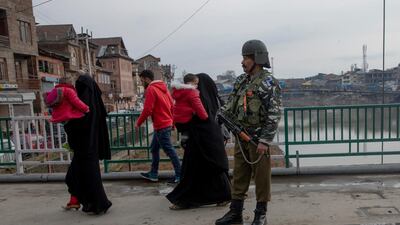Indian authorities on Wednesday temporarily revoked a ban on social media sites and restored full internet access in disputed Kashmir for two weeks, seven months after they stripped the restive region of its statehood and semi-autonomy and enforced a total communications blackout.
Internet access over mobile devices, however, will remain restricted to slow speed.
The restoration of the internet will remain in effect until March 17, a government order said. It gave no explanation of the time limit. A recent Supreme Court order had said the internet ban could not be indefinite.
The order issued by the region's home secretary, Shaleen Kabra, said internet access over fixed lines will be restricted to registered customers.
A K Srivastava, an official at state-run Bharat Sanchar Nigam Ltd, the leading broadband service provider in Kashmir, said it has begun implementing the new government order.
When it imposed the internet ban in August, the government said it was necessary to head off anti-India protests and attacks by rebels who have fought for decades for Muslim-majority Kashmir's independence or unification with Pakistan, which administers the other part of Kashmir. Both countries claim the Himalayan region in its entirety.
Digital rights activists denounced the tight internet restrictions and said they represented a new level of government control over information allowing it to further restrict freedoms in Kashmir. They were also criticised by politicians in Europe and the US, who called on the government to end the curbs.
Authorities in January slightly eased the internet ban, allowing the Indian-controlled territory's more than 7 million people to access government-approved websites over slow-speed connections. They heralded the decision as a step toward normalcy.
The portion of the divided Kashmir region that Hindu-majority India controls was already one of the most militarized places in the world before the government scrapped its statehood, began pouring in more troops and imposed harsh curbs on civil rights and information, including a blackout on the internet, cellphones, landlines and cable TV.
The internet lockdown inflicted heavy losses for the region's economy, according to the Kashmir Chamber of Commerce and Industry, which said at least 150,000 jobs were lost. Local tech companies had to close or relocate to other areas of India, suffering heavy losses.
During the service blackout, critically ill patients couldn't access government healthcare or seek insurance reimbursements online, students couldn't apply for fellowships or scholarships and distraught families couldn't contact relatives outside the region.
"They have finally restored internet, but after destroying so many businesses and ruining so many careers," said Khurshid Ahmed, a university student in Srinagar, the region's main city. "Though late, the international shaming has worked."
Internet shutdowns are a favored tactic of the government of Hindu nationalist Prime Minister Narendra Modi. During protests in New Delhi against a citizenship law passed late last year that fast-tracks naturalization for immigrants of all South Asia's major religions except Islam, internet and cell service were frequently disrupted.
Since Modi came into power in 2014, the internet has been suspended more than 365 times in India, according to the global digital rights group Access Now. In Kashmir, internet bans have been more frequent. More than a third of India's internet bans in the last six years were imposed there, some lasting months.
In 2017, United Nations experts said a ban on social media sites that year had "the character of collective punishment."

